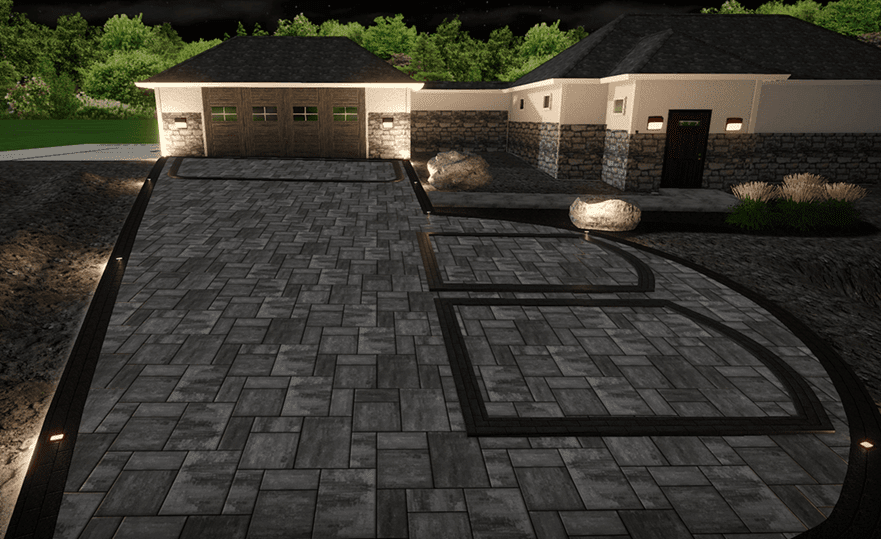When planning a new driveway, choosing the right pavers is one of the most important decisions you can make. The right material impacts the durability, aesthetics, and long-term maintenance of your space. With so many styles and materials available, homeowners often ask: what type of pavers for driveways will perform best? This guide explores the most popular driveway pavers, their pros and cons, and expert insights to help you choose the best option for your home.
Why Paver Choice Matters for Driveways
A driveway takes on daily vehicle traffic, exposure to weather, and weight loads that demand strength and durability. According to the Interlocking Concrete Pavement Institute (ICPI), properly installed driveway pavers can last 30 to 40 years if maintained correctly. Beyond functionality, the type of paver you choose also enhances curb appeal and adds value to your property.
Key factors to consider when choosing driveway pavers include:
- Durability – Can the paver handle the weight of vehicles and resist cracking?
- Maintenance – How often will it need repairs, sealing, or cleaning?
- Cost – What is the balance between initial investment and long-term value?
- Style – Does the material match your home’s architecture and landscaping?
Popular Types of Driveway Pavers
1. Concrete Pavers
Concrete pavers are one of the most common choices for driveways because of their strength and versatility. They are available in a wide range of shapes, colors, and textures, allowing homeowners to customize their driveway’s look.
Pros:
- High durability and load-bearing capacity
- Wide range of styles and finishes
- Relatively affordable compared to natural stone
- Easy to replace individual units if damaged
Cons:
- Can fade over time due to sun exposure
- Requires sealing to maintain appearance
- May crack in extreme freeze-thaw climates if not installed properly
Concrete pavers are ideal for homeowners who want a balance of strength, cost-effectiveness, and design flexibility.
2. Brick Pavers
Brick pavers provide a timeless, classic appearance that works well with traditional and historic homes. They are made from clay that is kiln-fired, making them strong and naturally resistant to color fading.
Pros:
- Elegant, traditional look that enhances curb appeal
- Long-lasting color that resists fading
- Environmentally friendly since they are made from natural materials
- Excellent slip resistance
Cons:
- Higher cost than concrete
- Limited color range compared to other pavers
- Can chip or crack under heavy loads if the base is not installed correctly
Brick pavers are best suited for homeowners looking for a sophisticated and enduring design, particularly in areas with historic or classic architectural styles.
3. Natural Stone Pavers
For a luxurious and high-end appearance, natural stone pavers such as granite, flagstone, limestone, or travertine are an excellent choice. Each stone is unique, providing unmatched beauty and texture.
Pros:
- Unique natural look with premium aesthetic appeal
- Highly durable and weather-resistant
- Increases property value significantly
- Stays cooler than concrete in hot climates
Cons:
- High upfront cost
- Requires professional installation
- Some stones may be porous and need sealing
Natural stone pavers are perfect for homeowners who want to invest in a one-of-a-kind driveway with exceptional durability and style.
4. Permeable Pavers
Permeable pavers are designed with gaps that allow water to drain through the surface, reducing runoff and helping manage stormwater. They are becoming increasingly popular for eco-conscious homeowners.
Pros:
- Environmentally friendly, promotes natural water absorption
- Reduces flooding and erosion risks
- Complies with stormwater management regulations in many cities
- Available in concrete, brick, or stone designs
Cons:
- Higher installation cost than standard pavers
- Requires periodic cleaning to prevent clogging of joints
- Not as widely available as traditional options
Permeable pavers are an excellent choice for homeowners concerned about sustainability and water management.
Read also: https://orolandscape.com/hardscaping-vs-landscaping/
5. Cobblestone Pavers
Cobblestone driveways, typically made from granite, basalt, or other natural stones, offer old-world charm and exceptional longevity. Many cobblestone driveways in Europe have lasted for centuries.
Pros:
- Extremely durable and long-lasting
- Distinctive, rustic look
- Minimal maintenance needed
- Resistant to heavy loads and weathering
Cons:
- Expensive compared to other options
- Rougher surface can make snow removal more challenging
- Installation can be labor-intensive
Cobblestone is best for homeowners seeking a traditional, rustic appearance combined with unmatched strength and durability.
Expert Tips for Choosing the Right Driveway Pavers
- Consider Your Climate – Freeze-thaw cycles, heavy rainfall, and extreme heat can affect how long certain pavers last. Concrete and natural stone generally hold up well in variable climates.
- Think About Maintenance – If you prefer low upkeep, choose durable materials like cobblestone or natural stone. Concrete pavers may require sealing and occasional replacements.
- Balance Budget and Longevity – While natural stone is more expensive, it can outlast cheaper materials. Concrete pavers provide a cost-effective balance of durability and affordability.
- Match Your Home’s Style – A modern home may pair well with sleek concrete pavers, while a traditional or colonial home might benefit from the warmth of brick.
- Hire a Professional Installer – Proper installation is critical. According to ICPI, poor base preparation is the leading cause of paver failure. A skilled contractor ensures long-term stability.
Conclusion
When deciding what type of pavers for driveways works best for your home, it comes down to balancing durability, budget, style, and maintenance. Concrete and brick offer versatile and classic options, while natural stone and cobblestone provide timeless elegance and longevity. Permeable pavers are an eco-friendly solution that also addresses drainage concerns.
Choosing the right paver is an investment in your property’s functionality and curb appeal. To ensure lasting results, consult with a professional hardscaping contractor who can recommend the best material for your home and climate.
Ready to transform your driveway with the perfect pavers? Contact a trusted local hardscaping expert today to explore your options and get started on a driveway built to last.

